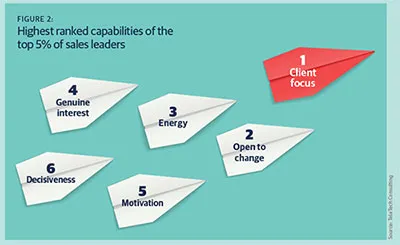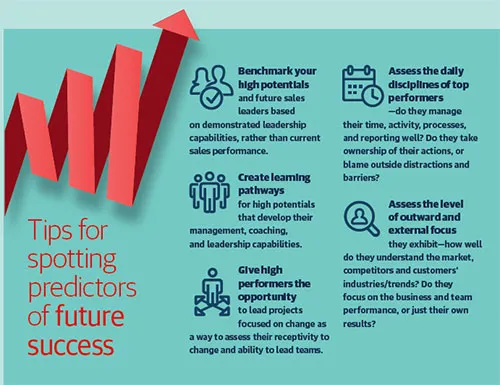One of the age-old debates regarding leadership is the classic question: “Are great leaders born or made?”
In the context of sales, the question is even more intriguing, as most sales leaders were once salespeople, but few salespeople go on to become great sales leaders.
We surveyed more than 24,000 sales professionals and 7,500 sales leaders across the globe to demystify and decode the DNA of exceptional sales leaders. We noticed profound differences between the top 5 percent of all sales leaders and average performers—“good” was distinctly different from “great.”

We distilled our findings from three separate global studies to identify what it takes to gain a winning position as a sales leader. In particular, three key insights emerged from our research and analysis:
Insight #1: Specific genetic markers predict future success. Many high-performing sales professionals fail to continue their track record of success in a leadership role. The sales leader success profile is usually evident early in sales careers, if you know what to look for.
Insight #2: Discipline, analysis, and adaptability are essential to evolution. Like many professions, great performance in sales leadership is a mix of the right art and science. Those who stand out have the discipline to analyze their market and industry, continuously review success metrics, and take decisive action.
Insight #3: Exceptional sales leaders have more evolved thinking. When we closely examined the difference between the best and the rest, we found there was one fundamental difference—it was in how they think, rather than in what they know.
Specific genetic markers predict future success
An ongoing challenge for sales organizations is how to recognize, reward, and ultimately retain their best salespeople. Given that many sales professionals are ambitious and good with customers, one way to reward and retain star performers is to make them sales leaders.
It’s not uncommon for companies to take their best salesperson and promote them into a sales leader role. This is simultaneously a massive risk and a significant opportunity. Put the right person in the role, and things improve for the team and the business. Give the wrong person the job and it’s a double-whammy—you lose a great salesperson and you’re stuck with a mediocre sales leader.
When we investigated the competencies that separate great salespeople from their contemporaries, we noticed the top 5 percent are significantly better in skill areas you would typically think of: questioning, negotiating, pitching, and client management. But also of note is that a small number of unexpected attributes also stood out among top salespeople: knowledge, process disciplines, and mindset. This suggests that combined with typical sales attributes, these three areas are distinct “genetic markers” of potential leadership.
Time management: One of the most striking differences displayed by the top 5 percent of salespeople is how highly they score in professional disciplines, particularly time management. Their scores in this area were 33 percent higher than the average and almost double those of the lowest 10 percent of salespeople.
Time management can be a deceptive concept. In reality, we all have the same amount of time, so we can’t manage it. We can only manage what we choose to do with the time we have. Individuals who have developed time management as a critical professional discipline in their sales roles generally find it easier to prioritize and manage the incredible amount of planning, analysis, and reporting required for success as they progress into sales leadership.
Knowledge: The best salespeople scored 50 percent higher than the lowest performers in key areas such as business acumen and knowledge of client industry. More impressively, top salespeople scored 83 percent higher than the lowest performers on their competitor knowledge. This illustrates the importance of examining potential sales leaders based on their strategic perspective and commercial acumen, alongside performance criteria.
Mindset: Moving into any new role requires an ability to deal with change and adapt to a new environment and new challenges. The ability to be flexible, cope, and learn quickly certainly helps sales professionals with the initial transition, but it’s more than that. We found that salespeople who score in the top 5 percent in these mindset areas carry this thinking into their leadership roles and tend to enjoy continued success as a result.

Discipline, analysis, and adaptability are essential to evolution
Sales leadership success only takes place if leaders focus on things that increase the desired quantity, focus, and quality of the activity of their sales staff. Focusing on the wrong areas is likely to have little or no impact. Examples include promoting the wrong business metrics, recognizing and incentivizing the wrong activity, or investing in the development of the wrong capabilities.
Meanwhile, top performers understand and practice the “science” of sales leadership. The top 5 percent of sales leaders share three attributes in this area: they are disciplined in that they are predictive, reflective, and corrective in their approach.
Predictive: They have what would seem to be a crystal ball ability to predict changes in their market and industry. This predictive nature stems from their strong knowledge of “industry and market trends”— the top 5 percent of sales leaders scored 45 percent higher than the bottom performers in this area. This ability to be outwardly focused and understand the broader market context gives them a distinct edge when it comes to creating first-mover advantages.
Reflective: Top performers have an adaptive approach and are open to change. The top 5 percent of sales leaders rated significantly higher in being open to change when compared with average and poor performers. This openness allows them to continuously and genuinely reflect and review the current state—assessing what is working well, while being open to making changes to capability and activity. This is supported by an obvious passion and capability for innovation, which is the change mindset on display.
Corrective: The unpredictable nature of sales means the ability to continuously review the direction and take decisive, corrective action when required is essential. Great sales leaders are incredibly decisive, but they leave their ego at the door, making and assessing decisions in the best interest of the business. They have a willingness to take corrective action when the status quo is no longer working, maintain an openness to change, and continuously review the direction.
Exceptional sales leaders have more evolved thinking
Our experience working with thousands of sales executives around the world has reinforced our view that, in most cases, mindset is the differentiator that makes the difference. It is a multiplier that allows leaders to apply their knowledge and skills in the most effective way, particularly when they’re under pressure. In fact, six of the 10 highest ranked capabilities of these exceptional sales leaders relate to mindset—the pattern of thinking that determines the quality of behaviors and actions.
Exceptional sales leaders are characterized by their ability to excel in being consistently energetic, having a drive for performance, and setting the pace. They also bridge the paradox of being flexible enough to adapt in the moment, yet decisive enough to make the all-important judgment call when needed.
Elite performers have an intimate awareness of four key elements: self-belief, motivation, coping, and focus. When combined, these elements create a positive and mentally tough mindset, which believes goals can be achieved through perseverance and patience. We define mental toughness as an unshakeable determination and conviction toward a particular goal in the face of pressure or adversity. To attain the highest level of mental toughness, the presence of some, or all, of the four components is required.
Two of these factors—motivation and self-belief—appear in the top quartile for the top 5 percent of sales leaders. And we also identified mindset hallmarks of the most highly evolved sales leaders.
They know results matter, and are irrelevant. What we see is that exceptional sales leaders have more than a mild obsession with continuous improvement—ensuring everyone on the team, including themselves, gets a little bit better every day. It might come as a surprise that they tend to have a less ‘perfectionist’ mindset. They tend not to think of situations, people, and outcomes as successes or failures, but rather focus on building on what’s working, while learning from mistakes and making positive changes.
They know they are the problem, and the solution. Self-awareness is a critical strand in the DNA of the exceptional sales leader. While they have positive beliefs about themselves and play to their strengths, they are intimately aware of their limitations.
They are strong collaborators, yet don’t rely on approval from others. Rather than relying on validation from results or peers and getting derailed by problems or failures, top sales leaders focus on who they are and what they do. They are very sensitive to the thoughts and feelings of others, yet they do not rely on it for their motivation and they certainly do not let it define who they are. What they do care about and understand is the importance of collaboration with others. This collaborative mindset is critical to engaging not only their team, but also other departments, in planning and executing their sales strategy.
Conclusion
It’s always been clear that the highest performing organizations are a product of exceptional leaders generating quality results with their teams. What has been less clear, until now, are the internal building blocks to being exceptional sales leaders and how they evolve.
There are a handful of attributes that appear early in a sales career that are strong predictors of future success as a sales leader. The concept of a natural leader may be overly simplistic, yet when you decode the DNA early and accurately, you are better able to spot the genetic markers that help you identify and develop the sales leaders of tomorrow.
















